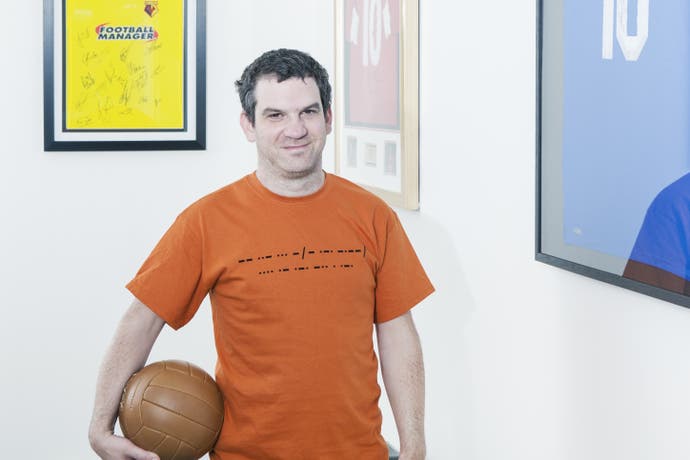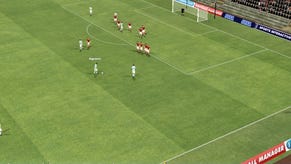Managing change in Football Manager 2014
Miles Jacobson explains why coming up with new ideas is the least of his worries.
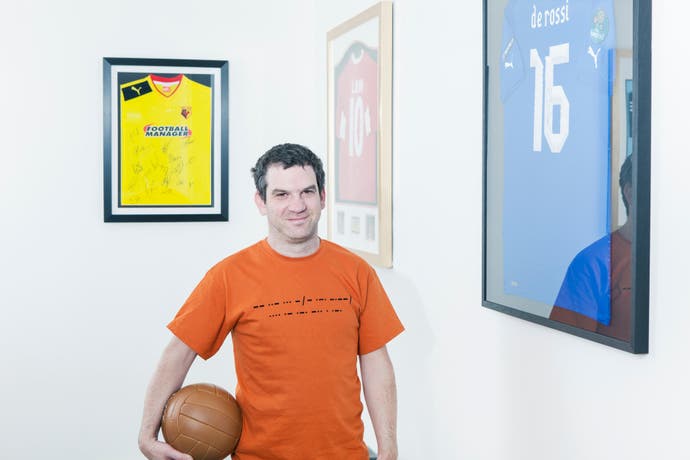
If carrying the weight of a beloved gaming franchise on his shoulders is a burden, Miles Jacobson certainly doesn't show it - in fact, if anything, listening back to my visit to Sports Interactive's head office, it was the interviewer that seemed under pressure.
Interruptions, meandering non sequiturs and, worst of all, repeated attempts to steer the conversation towards my Tonbridge game - I'd had a nightmare. Composure 4, Match Rating 4.2. I'd let myself down, I'd let Eurogamer down, and worst of all, I'd let the fans down.
The thing is, interviewing Miles isn't quite like your standard studio producer pow-wow. His enthusiasm is so infectious you feel like you need to apply topical cream afterwards. Here's someone who lives and breathes Football Manager, a title that, in its 21 years, has grown from bedroom-coder hobby project to global empire. The studio director had just returned from Korea where a team, under his stewardship, is working on FM Live, yet another offshoot for the series. Add to that the success of FM Classic, mobile iterations and record sales for last year's FM13, it's no wonder he's excited.
"When people say, 'Surely you've added everything you can add,' I actually think they're bonkers." I'm sat in Miles' office, mug of tea in hand, and I feel like I've got off to a bad start. It's been a long-standing criticism of the series that it values complexity for complexity's sake - but, it seems, to lament the addition of fiddly new feature upon fiddly new feature is to fundamentally misunderstand the development process. Football Manager is, above all else, a simulator, and managing a football club in real life is such a complex, nuanced role, with parameters in a state of near-constant flux, that features are never foisted upon the game just to sell another year's worth of copies. Quite the opposite. Making a new Football Manager, more than anything, is about deciding what to leave out.
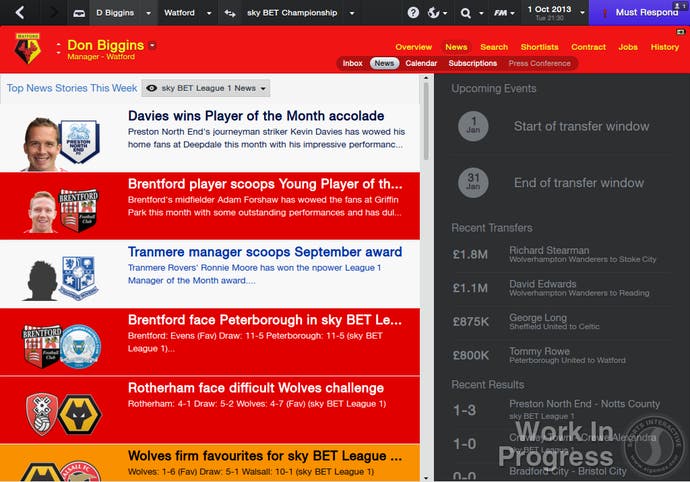
"We've been doing this process for a long time. The feature meetings were three weeks last year, rather than two, because we had 1500 features to go through. And that's not including the big stuff that's happening in the world of football. That's enough ideas for two years' worth of games in one year."
Miles and the team meet up shortly after each year's release, each bringing their own suggestions to the table. "Whether it's an idea from the forums, something we've heard down the pub, or something that's actually happening in world football, everything gets debated equally."
Each idea put forward then goes to a vote. Below 40 per cent, and it's sent back to the drawing board. Above 90, and it's all but guaranteed inclusion in a forthcoming release. If only football's governing bodies conducted themselves with such fairness and inclusivity.
"When people say, 'Surely you've added everything you can add,' I actually think they're bonkers."
Miles Jacobson
The tricky part is deciding which of these approved ideas to fast-track and which to hold back, or which ones might simply take too much time. Another consideration is how improvements are best grouped. Some new features for the game's transfer system, for example, have been held ready for this year, where a revamp of the shortlisting system (which controls how the game's AI conducts other managers' purchases) is one of the most prominent changes.
Most important of all, though, is that the game feels like it's reacting to the real world outside of it. The transfer market has changed massively since the shortlist system was created, and the game itself must change in turn.
"For example, you've got a guy playing in the Championship a few seasons ago now playing in the Indian Premier League. And you're starting to see English lower-level players moving abroad to Sweden, to Denmark. That just wasn't happening 10 years ago."
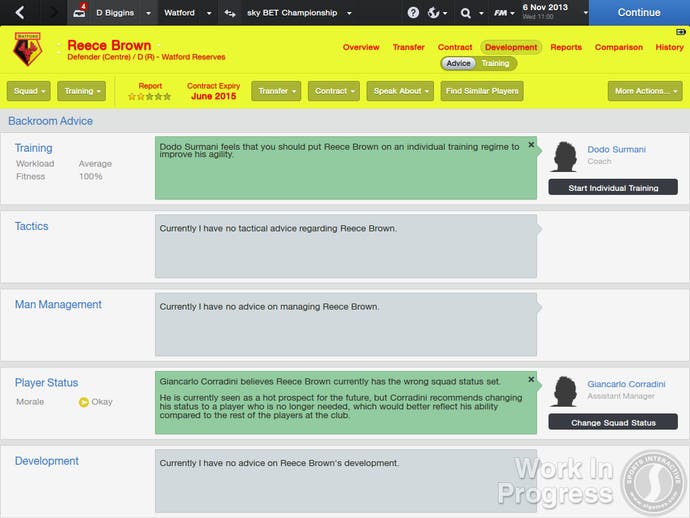
The new, nomadic breed of British player is a mere footnote compared to Financial Fair Play (FFP) - the implementation of which has given the team more than a few headaches. Miles was road-testing the new system on his flight back from the Far East, and it's fair to say that making the system work within the game sounds just as hard as FIFA is finding it to enforce out here in reality.
These difficulties, however, must pale in comparison to those encountered in FM14's new tactics system. Gone are the sliders of old - which allowed you to, say, incrementally nudge your defensive line deeper or further forward - with more nuanced player roles and commands stepping up in their place. The decision to opt for such a radical overhaul is a brave one, particularly with such a passionate fanbase, but the reasons behind it - like so much of what goes in to every new FM - were both technical and grounded in real life.
The match engine, quite simply, had become too sophisticated to work within the 'classic' control system. And the changes, taken under great consideration, should allow for a much more realistic experience of how tactics are prepared on the training ground.
"Going to training grounds is now a big part of my job. Managers don't turn around and tell players, 'I want you to be two notches further ahead.' What managers do is give players roles and explain those roles to them," Miles says.
"With Gary Neville joining Sky last year you saw player roles become a much larger part of the accepted discourse on football - you don't have simple midfielders and forwards any more. You have ball-winning midfielders, anchormen, playmakers - that's how managers speak to players."
With the new system, players will be given defined roles before the game and instructed how to react to different situations on the pitch - essentially expanding on the touch-line shouts feature to give a more natural, organic feel to the control you have of your team. Whether or not the new engine is balanced - yet alone challenging and fun - is something we won't find out until we get our hands on it, but two teams of testers are working around the clock to make sure it's as good as it possibly can be.
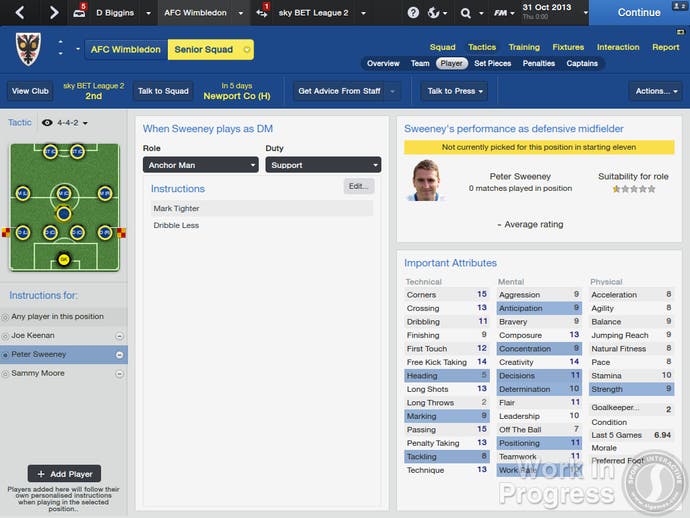
While I expect finessing and tweaking this most critical part of the game will dominate next year's release, Miles and the team plan three years ahead - and, asked for a world exclusive (I'm sure it isn't) of something we'll see in FM15 or 16, his eyes light up once more.
"At some point in the future there will be a revamp of injuries in the game - it's something that's moved five times now. The injury module works, but it's not as great as we'd like it to be. We're now working with PhysioRoom, and that'll steer us in the future. It's one area that we've not got completely accurate yet."
It says everything about the philosophy of the studio that as drab a part of the game as injuries, something that's hardly likely to lure new customers or secure five-star reviews, is being taken so seriously, and talked about with such clear enthusiasm.
As the way we consume football changes, so must Football Manager. It seems like a simple enough statement, but just thinking back to how football has changed over the last 10 years, let alone 21, makes me realise how Sports Interactive's greatest concern - far from worrying about running out of ideas - must just be keeping up.
"There's so much room for growth. We've been around for 21 years, but I feel like we're only just beginning. We want to entertain as many people as possible. There are other things we could do in the simulations space revolving around football that others haven't necessarily done yet."
A hint at Football Linesman 2015? Or a mobile groundsman simulator? Whatever Sports Interactive does next, it's going to be worth talking about.
